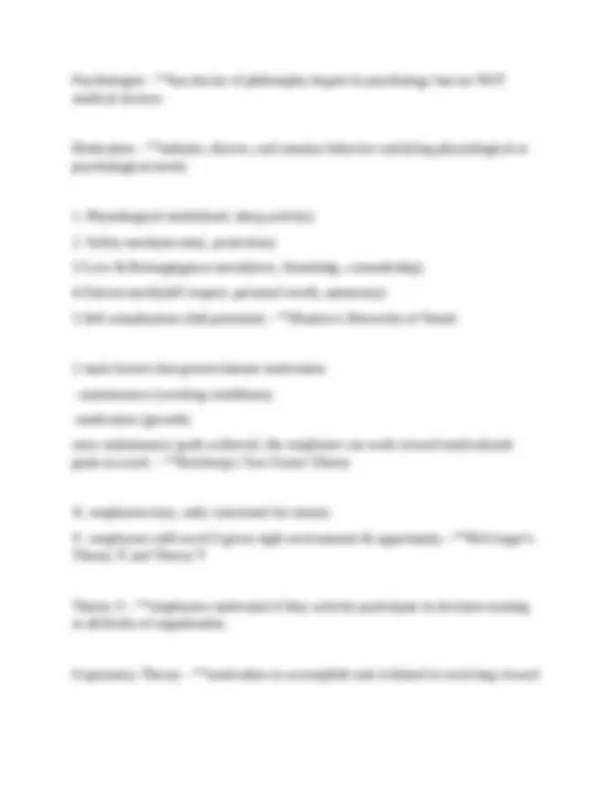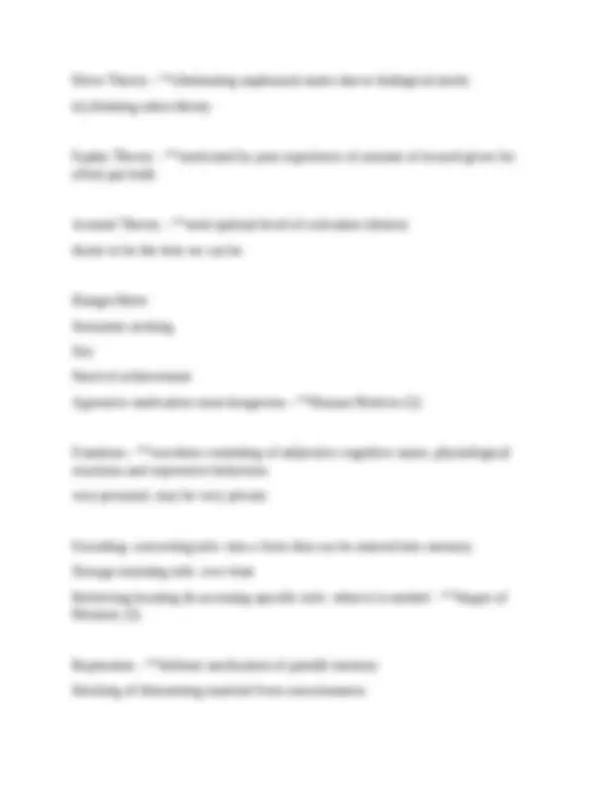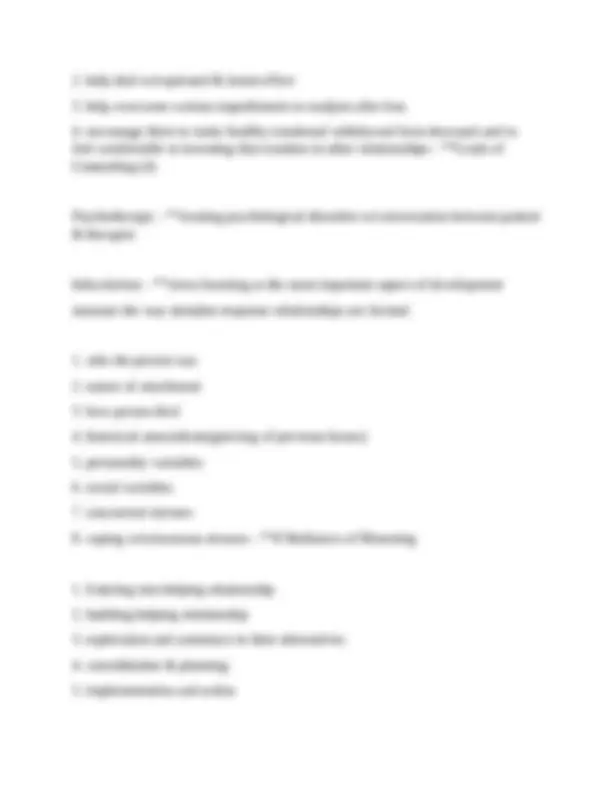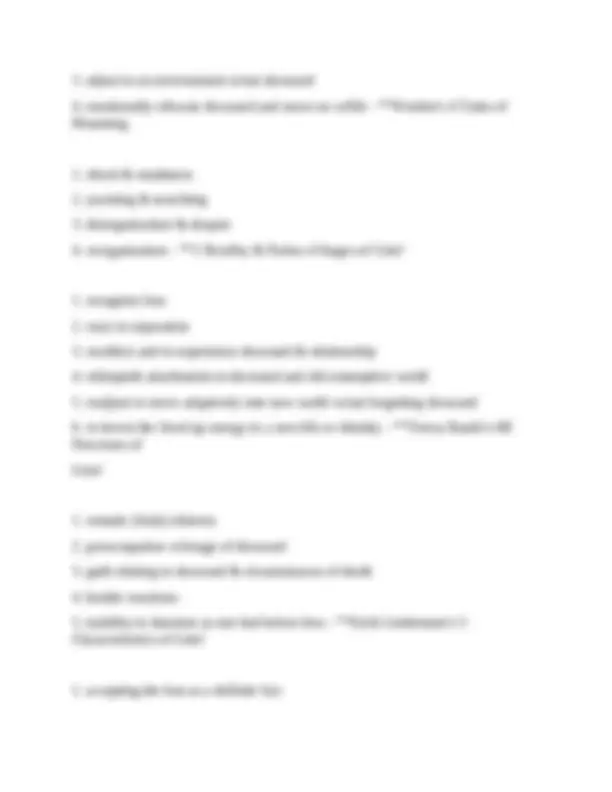Download Thanatology: The Study of Death and Grief and more Exams Physiology in PDF only on Docsity!
Thanatology exam: quiz solution
Psychology - **study of behavior and mental processes Educational Psychology - **Studies education systems goal is to improve education methods of teaching, learning, curricula Clinical Psychology - **understand, diagnose and treat abnormal/deviant behavior Social Psychology - **how behavior effects others Personality Psychology - **personality tied to mental processes of individual Developmental Psychology - **the way behaviors develop and change thru lifespan focus on children language development, thinking skills, emotions Counseling Psychology - **Latin "to know" study of origins and consequences of thoughts, memories, beliefs, perceptions, explanations and other mental processes Cognitive Psychology - **Studies internal mental processes ie) thinking, memory, concept formation, perception and processing of info.
Functionalism - **the function, NOT the structure of conscious experience Biological - **all of our behaviors can be traced to the biological functions of the brain. caused by chemicals of our physical body Psychoanalysis - **therapy to bring unconscious desires into consciousness to resolve problems. date back to early childhood experiences Humanistic - **uniqueness of individual and search for self actualization Socio-cultural - **how one interacts w/society how society/culture impact them Cognitive - **simplest matters studied ie) perception of objects, attention pattern recognition, memory, language, reading & writing Structuralism - **reducing experience to its most basic parts, determining the laws by which the parts are synthesized. investigating the structure and content of mental state by introspection. Psychiatrist - **medical doctor completed training in field of mental health/psychiatric residency
Drive Theory - **eliminating unpleasant states due to biological needs ie) drinking when thirsty Equity Theory - **motivated by past experience of amount of reward given for effort put forth Arousal Theory - **seek optimal level of activation (desire) desire to be the best we can be Hunger/thirst Sensation seeking Sex Need of achievement Agressive motivation-most dangerous - **Human Motives (5) Emotions - **reactions consisting of subjective cognitive states, physiological reactions and expressive behaviors. very personal, may be very private. Encoding: converting info. into a form that can be entered into memory. Storage:retaining info. over time Retrieving:locating & accessing specific info. when it is needed - **Stages of Memory (3) Repression - **defense mechanism of painful memory blocking of threatening material from consciousness
Personality - **stable system of determining tendencies w/in an individual Psychoanalytic Theory by S. Freud - **Ego: conscious state of thoughts & perceptions that serve as mediator between superego & id Superego: preconscious state of memories and stored knowledge (ideals, morals, conscience from parents) Id: unconscious state of fears, irrational wishes, immoral urges, violent motives, unacceptable desires
- repression
- projection
- reaction formation
- regression
- denial
- displacement
- sublimation
- rationalization - **Ego Defense Mechanism (8) (Real pretty range rovers don't drive sucky roads)
- social comparison
- conformity
- obedience
- aggression
- prejudice
- leadership
- initial learning
- uncomfortable use
- consciously skilled
- naturally skilled - **Phases of acquiring interpersonal skills (4)
- Funeral Director dominance
- bombarding w/questions
- inappropriate self-disclosure
- offering platitudes or false reassurance
- discouraging expression of emotions & tears(6)
- emotional distancing - **Barriers of effective communication At-Need - **death has occurred and funeral director is advising the family from time of death until final disposition including selection of services & merchandise during arrangement conference. Pre-Need - **counseling that occurs before a death Post Funeral adk Aftercare - **appropriate acts that come after the funeral Grief counseling - **helping people facilitate uncomplicated grief to a healthy completion of the tasks of grieving w/in a reasonable time frame. Grief Therapy - **specialized techniques which are used to help people with complicated grief reactions
- Increase/confirm reality of loss
- help deal w/expressed & latent effect
- help overcome various impediments to readjust after loss
- encourage them to make healthy emotional withdrawal form deceased and to feel comfortable re-investing that emotion in other relationships - **Goals of Counseling (4) Psychotherapy - **treating psychological disorders w/conversation between patient & therapist behaviorism - **views learning as the most important aspect of development measure the way stimulus response relationships are formed
- who the person was
- nature of attachment
- how person died
- historical antecedents(grieving of previous losses)
- personality variables
- social variables
- concurrent stresses
- coping w/extraneous stresses - **8 Mediators of Mourning
- Entering into helping relationship
- building helping relationship
- exploration and assistance to their alternatives
- consolidation & planning
- implementation and action
- adjust to an environment w/out deceased
- emotionally relocate deceased and move on w/life - **Worden's 4 Tasks of Mourning
- shock & numbness
- yearning & searching
- disorganization & despair
- reorganization - **J. Bowlby & Parkes 4 Stages of Grief
- recognize loss
- react to separation
- recollect and re-experience deceased & relationship
- relinquish attachments to deceased and old assumptive world
- readjust to move adaptively into new world w/out forgetting deceased
- re-invest the freed up energy in a new life or identity - **Teresa Rando's 6R Processes of Grief
- somatic (body) distress
- preoccupation w/image of deceased
- guilt relating to deceased & circumstances of death
- hostile reactions
- inability to function as one had before loss - **Erich Lindemann's 5 Characteristics of Grief
- accepting the loss as a definite fact
- adjusting to life w/out deceased
- forming new relationships in the world - **Erich Lindemann's 3 Steps to Recovery
- sensations of somatic distress i.e.) choking, shortness of breath, lack of strength
- intense preoccupation w/image of deceased
- guilty feelings
- emotional distancing in relationships w/others
- disoriented behavior i.e.) restlessness, insomnia, inability to concentrate - **Normal Grief/Acute Grief Response
- Empathy
- Respect
- Warmth & Caring
- Genuineness - **The 4 Helping Characteristics Directive: counselor takes live speaking role, asking q's, suggesting course of action Non-Directive: developed by Carl Rogers ~can only be established by a rapport w/client ~goal is to enhance person's capacity for social functioning by: altering person's feelings thru self-awareness and sensitively listening & observing - **Directive vs Non-Directive (aka client centered) Counseling
- Crisis
- Informational
- Psychotherapy
- Neutral or Ineffective
- Helpful
- Facilitative - **Levels of Helping Characteristics of a Funeral Director Paraphrasing - **restating person's basic message in smilier but usually fewer words, state in your words what person said Clarifying - **Bringing vague content in the interaction into clearer focus or understanding. Goes beyond paraphrasing b/c you make a guess about the person's basic message and restate it. Perception Checking - **asks for feedback about the accuracy of listening skills, checks that an understanding has taken place with other person Leading - **anticipating where the person is going and responding w/ an appropriate encouraging remark. ie) are there any other questions? what are some of your brother's hobbies? Questioning - **gaining info. and increasing understanding gather info. w/out seeming to demand it Reflecting Feelings - **express in fresh words the essential feelings states or strongly implied of the person Informing - **sharing facts possessed by funeral director; providing info. that will allow them to make an informed decision
Summarizing - **tying together several ideas & feelings at the end of an arrangement conference Effective & Destructive Use of:
- eye contact
- posture
- physical distance
- facial expression
- gestures
- setting
- position
- voice tone
- rate of speech
- level of energy
- physical appearance - **1. appropriate gaze, do not stare, not looking away
- lean fwd, relaxed but attentive
- natural distance, 3ft or arms length
- matches emotional tone of situation
- move slowly, congruent w/ content
- casually draws ppl together, free from interruptions, pleasant colors and well organized
- seated w/ nothing between self & other person, same eye level as family, choose to sit in open seat - not dominant position
- relaxed & matches emotional situation
- natural pace, at times slower than usual
- maintain alertness thru lengthy arrangement conference
- substance abuse
- post-traumatic stress disorder - **Complicated Grief Reactions Anticipatory Grief - **presence of grief in anticipation of death or loss; the actual death comes as a confirmation of knowledge of a life-limiting condition Complicated Grief - **grief extending over a long period of time w/out resolution Categories of Grief that need Therapy - **exaggerated grief, prolonged grief, delayed grief, & grief masked as somatic or behavioral symptoms 1.numbness 2.denial and isolation 3.anger 4.depression 5.acceptance - **Phases of Grief (5)
- rule out physical disease
- set up contract & establish an alliance
- revive memories of deceased
- assess which four mourning tasks not yet completed - **Procedures of Grief Therapy
- ensuring patient is not worse off than before coming to treatment
- restraining the overwhelming effects of treatment
- helping patients deal with the awkwardness often experienced in therapy - **Special considerations of Grief Therapy (3)
Suicide survivor grief- important part of healing process - **hearing how others have struggled through and survived the pain, confusion, questions & stigma of suicide loss shame guilt fear - **Predominant feelings of suicide survivors (3) be honest and tell children the death was a suicide allow children to see your grief - **Telling children about suicide
- sense of unreality
- numbness
- nightmares
- intrusive images - **Sudden death symptoms (4)
- it is difficult for us to be or feel helpful to the person experiencing bereavement
- make us aware of our own previous losses
- make us think about our own, possible, future losses
- force us to contemplate our own mortality - **Ways that experiencing grief in others affects us as funeral directors (4)
- handling a loss similar to loss personally experienced
- unresolved loss issues when dealing with grieving family
- handling a horrendous death
hypochondriasis grief existential grief alcohol overuse institutions - **Factors that increase the risk of developing depression.






























